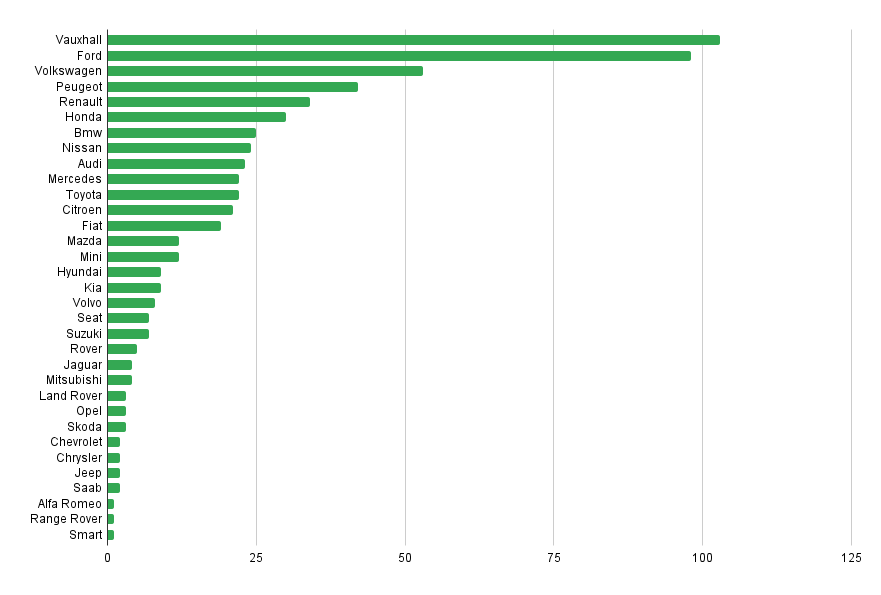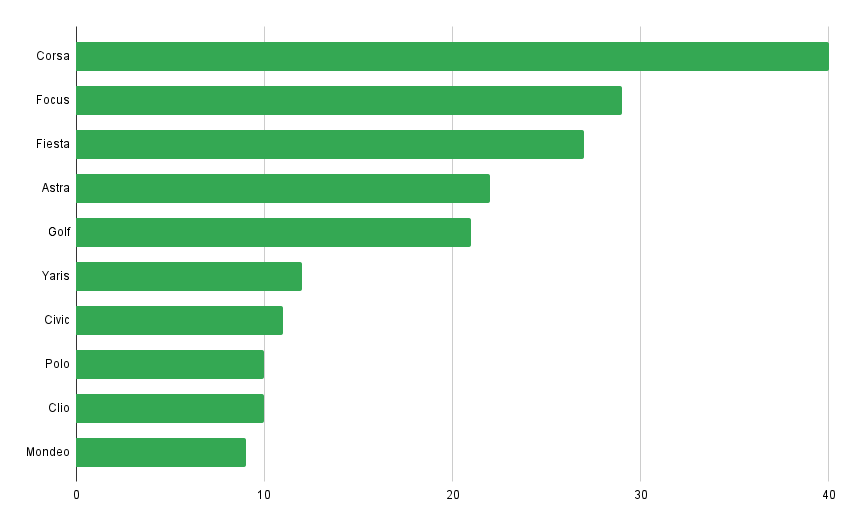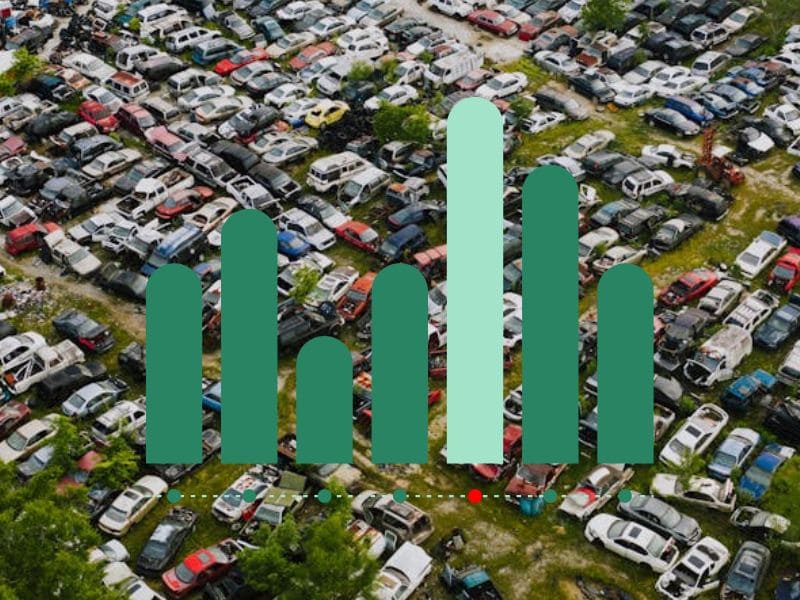As we move further into 2024, the car market continues to evolve, with old models making way for new, more advanced vehicles. Understanding the trends in car scrapping can provide insights into consumer preferences, vehicle durability, and environmental impacts.
In this blog, we will dive into the data on the number of cars we’ve scrapped by make so far in 2024.
This information highlights which brands have seen the most vehicles retired this year and offers a glimpse into the reasons behind these trends.
Overview of the Scrap Car Data
Let’s start by looking at the raw numbers. The number of cars Scrap My Car Company have scrapped by make so far in 2024, is as follows:

See below the top 10 car models we’ve scrapped so far in 2024.
Analysis of the Top Scrapped Car Makes
Vauxhall
Vauxhall leads the pack with 103 cars scrapped in 2024. This high number could be due to a few factors. Vauxhall vehicles, particularly older models, may have reached the end of their lifecycle. Additionally, the introduction of newer models might prompt owners to upgrade, leading to an increase in scrapped vehicles. Vauxhall’s popularity in the UK also means there are simply more Vauxhalls on the road, which naturally results in a higher number being scrapped.
Ford
Coming in second, Ford saw 98 vehicles scrapped. Ford’s widespread use as family cars and in commercial fleets means they have a significant presence on the roads. Similar to Vauxhall, many Ford models might be reaching the end of their usable life, especially those bought in the early 2000s. The durability and reliability of Ford vehicles are well-known, but even the sturdiest cars eventually need to be retired.
Volkswagen
Volkswagen, with 53 cars scrapped, is next. Known for their build quality and longevity, Volkswagen cars often serve their owners well for many years. However, environmental regulations and the push towards electric vehicles might encourage owners to trade in their older models. Volkswagen’s commitment to new, greener technologies means older internal combustion engine models are being phased out.
Mid-Range Scrapped Car Makes
Peugeot
Peugeot, with 42 cars scrapped, reflects a similar trend. The brand is known for its small to mid-sized cars, which are popular in urban areas. The scrapping numbers suggest that many older Peugeots, possibly from the early 2010s, are being retired as newer models and electric options become available.
Renault
Renault follows with 34 cars scrapped. Renault’s emphasis on compact cars for city driving means they are widely used. The relatively high scrapping rate could indicate that older models, which might not meet current emission standards, are being taken off the road.
Honda and BMW
Honda and BMW saw 30 and 25 cars scrapped, respectively. Honda vehicles are known for their reliability, so the scrapping numbers likely reflect older models finally being retired after many years of service. For BMW, the scrapped cars are probably older luxury models. Luxury cars tend to be well-maintained, but once they reach a certain age, the cost of repairs can outweigh the benefits of keeping them.
Luxury and Premium Brands
Audi and Mercedes
Audi and Mercedes, both with 23 and 22 cars scrapped respectively, are premium brands known for their performance and luxury. The scrapped vehicles from these makes likely include older models that are no longer cost-effective to maintain. Additionally, newer models with advanced technology and improved efficiency encourage owners to upgrade.
Toyota
Toyota, with 22 cars scrapped, is renowned for its durability and reliability. The relatively low number of scrapped Toyotas indicates that many of their cars continue to perform well for many years. However, as with other brands, the move towards hybrid and electric models likely contributes to older cars being scrapped.
Lower Range Scrapped Car Makes
Citroën and Fiat
Citroën and Fiat, with 21 and 19 cars scrapped respectively, are known for their affordable and compact cars. These vehicles are popular in urban areas where space and efficiency are key. The scrapping numbers suggest that many older models are being phased out in favour of newer, more efficient options.
Mazda and Mini
Mazda and Mini, with 12 cars scrapped each, are brands known for their unique design and reliable performance. The scrapping numbers here reflect a mix of older models being retired and owners upgrading to newer versions with better technology and efficiency.
Hyundai and Kia
Hyundai and Kia, both with 9 cars scrapped, are brands that have grown in popularity over the past decade. Known for offering good value and long warranties, the relatively low scrapping numbers suggest that many of their vehicles are still in good working order. However, older models from the early 2000s are starting to be phased out.
The Rarer Scrapped Makes
Volvo, Seat, and Suzuki
Volvo, Seat, and Suzuki have 8, 7, and 7 cars scrapped, respectively. These brands are known for their niche markets: Volvo for safety, Seat for sporty design, and Suzuki for affordability. The lower scrapping numbers indicate that many of their vehicles are still valued by owners or are less common on the roads to begin with.
Rover, Jaguar, and Mitsubishi
Rover, Jaguar, and Mitsubishi, with 5, 4, and 4 cars scrapped respectively, reflect brands that either have a smaller presence in the market or produce more durable vehicles that remain in use longer. Jaguar and Mitsubishi, in particular, have a reputation for producing high-performance and long-lasting cars.
The Least Scrapped Car Makes
Land Rover, Opel, and Skoda
Land Rover, Opel, and Skoda, each with 3 cars scrapped, show that these vehicles are either more durable or less prevalent. Land Rover’s rugged designs often mean their cars have a longer lifespan, while Opel and Skoda’s reliability keeps them on the road longer.
Chevrolet, Chrysler, Jeep, and Saab
With 2 cars scrapped each, Chevrolet, Chrysler, Jeep, and Saab reflect brands that have either a niche market or are less common. The low numbers might also indicate strong owner loyalty or robust vehicle durability.
Alfa Romeo, Range Rover, and Smart
Finally, Alfa Romeo, Range Rover, and Smart each had only 1 car scrapped. These brands, known for their distinctive style and performance, likely have a smaller market presence, resulting in fewer cars reaching the end of their lifecycle in 2024.
Top 10 Car Models We’ve Scrapped So Far in 2024
As an added bonus, we’ve also pulled out our top 10 most scrapped car models too.
You can see below, the Vauxhall Corsa was our most commonly scrapped car model so far in 2024. Followed by the Ford Focus and the Ford Fiesta.

The raw numbers:
| Make | Model | Scrapped (Jan – July 2024) |
| Vauxhall | Corsa | 40 |
| Ford | Focus | 29 |
| Ford | Fiesta | 27 |
| Vauxhall | Astra | 22 |
| Volkswagen | Golf | 21 |
| Toyota | Yaris | 12 |
| Honda | Civic | 11 |
| Volkswagen | Polo | 10 |
| Renault | Clio | 10 |
| Ford | Mondeo | 9 |
Conclusion
The data on the number of cars scrapped by make in 2024 provides a fascinating snapshot of the automotive landscape. Brands like Vauxhall and Ford dominate the scrapping numbers due to their widespread use and the natural ageing of their vehicles. Mid-range brands like Peugeot, Renault, and Honda show a mix of ageing fleets and consumer upgrades. Luxury and premium brands like Audi and Mercedes have lower scrapping numbers, reflecting their durability and the tendency for owners to maintain these vehicles longer.
Understanding these trends helps us appreciate the complex factors that influence car scrapping, from technological advancements and environmental regulations to consumer preferences and vehicle durability. As we move forward, the push towards greener, more efficient vehicles will continue to shape the automotive market, influencing which cars we drive and ultimately, which cars we scrap.
If you enjoyed this article, check out part two for July – December 2024.

